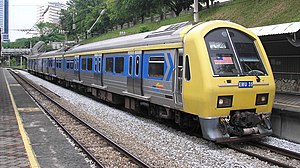The governments of Malaysia and Singapore reached a landmark agreement in May 2010 to end the operations of nearly 80-year-old railway lines and stations in Singapore. In our study, the cessation of the railway services operated by Keretapi Tanah Malaya (KTM), a firm owned by the Malaysian government, with effect from July 1, 2011 is used in a quasi-experiment design to test the effects of the removal of train noise externalities on real estate values. Based on the nonlanded private housing transactions data from January 2005 to June 2013, we find that average prices for houses located within a 400-m boundary from the railway lines increased by 3.5% relative to prices for houses located outside the 400-m boundary after the cessation agreement has been announced. The removal of train noise externalities increases housing prices in the affected area by 13.7% on average in the post-cessation period of the KTM railway services. Realized economic benefits associated with the railway services cessation were estimated at S$0.36 billion based on houses sold in the post cessation period of the KTM railway services.

https://en.wikipedia.org/wiki/Keretapi_Tanah_Melayu
http://onlinelibrary.wiley.com/doi/10.1111/1540-6229.12123
http://onlinelibrary.wiley.com/doi/10.1111/1540-6229.12123
by Mi Diao, Yu Qin andTien Foo Sing; all of the Department of Real Estate, National University of Singapore, Singapore
Real Estate Economics http://onlinelibrary.wiley.com/journal/10.1111/(ISSN)1540-6229 via Wiley http://onlinelibrary.wiley.com
American Real Estate and Urban Economics Association
Early View (Online Version of Record published before inclusion in an issue); Article first published online: November 4, 2015
Early View (Online Version of Record published before inclusion in an issue); Article first published online: November 4, 2015
No comments:
Post a Comment